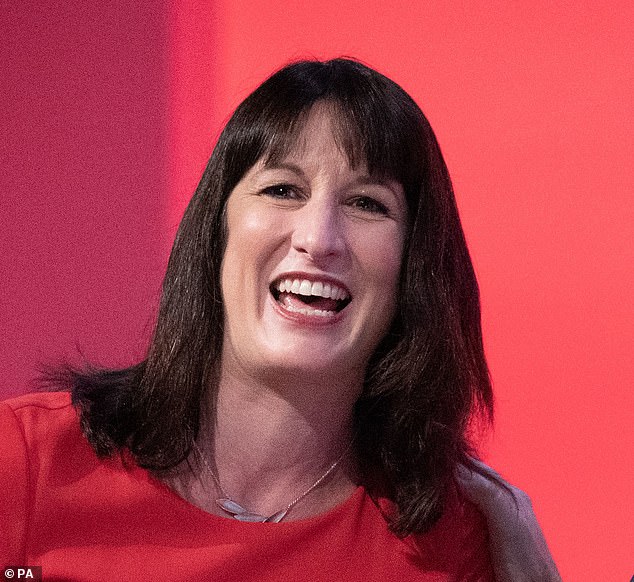[ad_1]
When in difficulty, politicians grasp at straws. The weird scenes in the Commons on Wednesday of a lachrymose Chancellor and a seemingly oblivious Prime Minister as the markets tanked frame Labour’s first year in office.
Labour apparatchiks claim the surge in gilt yields – as Keir Starmer left Rachel Reeves blowing in the wind – as evidence that financial markets believe in the Chancellor’s ironclad grip on the public finances.
Bond buying by BlackRock, Schroders and Fidelity as gilt yields soared is cited as confidence that the budget rules will hold. Fascinating that L&G, among the biggest UK asset managers, says a ‘lack of clarity’ in the Government’s fiscal stance has unsettled markets.
The unusual juxtaposition of Reeves in tears on Wednesday and cackling in the company of Starmer a day later doesn’t suggest stability. The markets don’t really believe it. The yield on the 30-year-long bond has jumped 0.64 of a percentage point to 5.33 per cent in the 12-months since Labour won. The ten-year yield is 0.36 per cent higher at 4.56 per cent. Some of this can be attributed to Trump mayhem. UK rates shadowing the US are only part of the story.

No laughing matter: The unusual juxtaposition of Rachel Reeves in tears on Wednesday and cackling in the company of Keir Starmer a day later doesn’t suggest stability
Oxford Economics suggests that the U-turns on welfare and winter fuel, together with likely revisions to Office for Budget Responsibility growth assumptions, have opened a £20billion to £30billion funding chasm to be closed in the autumn.
A black hole of that size cannot be surmounted by small shifts in secondary taxes such as a bank levy or punishing wealth.
Similar charges already have caused enough damage with private equity princelings among those fleeing to Milan.
The Chancellor’s only choice may be to raid one of the bigger pots of government income, flying in the face of manifesto promises. Freezing tax thresholds for a further two years is a possibility, even though it already has propelled millions of working people into higher bands. A surcharge on corporation tax is an option. That would be a fresh blow to business confidence. It is going to be a long, hot summer for Reeves on a personal roller-coaster.
Beautiful day
July 4 for this writer will always be associated with the delightful celebration in our Washington DC neighbourhood. The children’s bikes would be decorated with red, white and blue ribbons and balloons, and join a procession down to the local Palisades Park.
US Independence Day this year is marked by Donald Trump’s ‘big beautiful’ tax and spending bill. It reinstates Trump’s first term tax cuts for the better off and lifts spending on defence and border security. It also slashes benefits for the less well and elderly with cuts in Medicare and Medicaid. The estimated outcome is a $3.4 trillion hit to the nation debt over the next decade. That underestimates the supply side impact of lower personal and corporate tax on enterprise, entrepreneurship and output.
Bank robbery
A letter from a reader in Abingdon bemoans NatWest’s decision to close its listed bank building in the town. Meanwhile, Santander is making no secret of its intention to shutter unspecified TSB outlets if it reclaims the bank from Sabadell.
That’s no way to win hearts and minds.
DIY INVESTING PLATFORMS

AJ Bell

AJ Bell
Easy investing and ready-made portfolios

Hargreaves Lansdown

Hargreaves Lansdown
Free fund dealing and investment ideas

interactive investor

interactive investor
Flat-fee investing from £4.99 per month

InvestEngine

InvestEngine
Account and trading fee-free ETF investing
Trading 212
Trading 212
Free share dealing and no account fee
Affiliate links: If you take out a product This is Money may earn a commission. These deals are chosen by our editorial team, as we think they are worth highlighting. This does not affect our editorial independence.
[ad_2]
This article was originally published by a www.dailymail.co.uk . Read the Original article here. .

